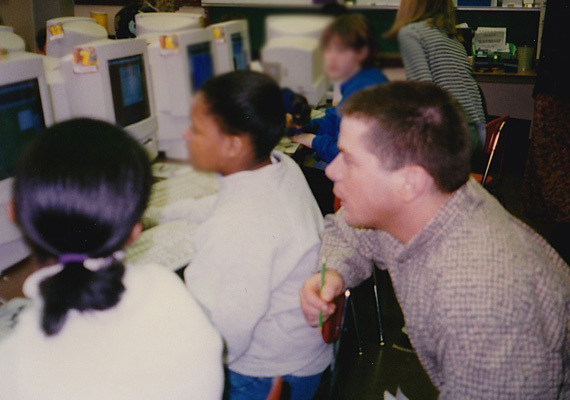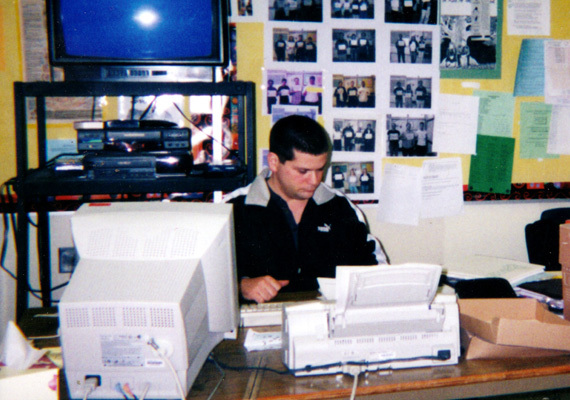
When looking back to the 1990s, one could see it as a time tolerance towards people who were different was becoming mainstream. But it wasn't mainstream in our public school system, at least when it came to curbing anti-Semitism (that's a whole separate topic deserving of future attention) or, especially, homophobia.
In 1998, I was teaching in a somewhat conservative school district in Southern California. Still, the school was very diverse and most of the teachers, at first, appeared to be tolerant. But it was in our computer lab, named after a former teacher, where my ears heard one of the most shocking statements in my life.
The lead 6th Grade Core (Language Arts and Social Studies) teacher was in the room where students from both of our classes were doing projects. She was young, pretty, appeared to be a very good teacher and always pointed out how she was a Christian girl at heart. But her heart certainly was in a bad place when I asked her what teacher the computer lab was named after (and I'll disguise his name for the purposes of this article).
"Steven Kindle, he died three years ago," she said. Of course, being the curious person I always was, my face became a living question mark that the teacher could easily pick up on. Then, she said six words that I will never forget - at least when they are mentioned in the same sentence. "He was gay; he had AIDS!" she said without even attempting to be quiet. The young teacher had a vengeful look of rage in her eyes that I'll never forget. It was almost as if she wished she was the one who killed him.
There were two other teachers in the room and they didn't seem to mind what the misguided teacher had said. But it hit me like the dirty red kickball hit my stomach during recess in 5th grade, knocking the wind out of me. Just like that time in 5th grade, I was speechless. How could someone teaching our kids get away with saying such a thing? How could I let her get away with saying that? (Not to excuse myself, but this was 1998.)
I discussed this with another teacher, who, like me, was also disturbed at the behavior of our teachers and administration, despite naming the computer lab after a man who was gay and died of AIDS. She revealed that the year before, a young male teacher at our school, who was thought to be gay, was literally witch-hunted by the school district. Other teachers spied on him and reported things to the principal that she could use against him.
Even one year later, other teachers made fun of his "wavy right hand," his "West Hollywood" appearance and other things they would now be condemned for doing. It ends up that when trying to get a job at another nearby school district, he was allegedly given a brutal reference, despite being told that he would receive a neutral reference - something that was worked out the previous school year with our principal, the teachers union and the teacher.
I thought that, perhaps, I was just at a bad school and when I moved up to the Los Angeles area to teach at a junior high school in a school district at the southeastern end of San Fernando Valley, things were even worse. When a student said the word "faggot," I became angry and wrote him a detention. The student couldn't understand why he was being punished and I mentioned that although I can't control derogatory language outside my classroom, I expect tolerance and respect when they are with me.
"But 'faggot' isn't a bad word!" he yelled, almost crying that he was being disciplined. Apparently, his parents agreed and complained about me and the detention to our administration. The detention was thrown away and I was told that I needed to "choose my battles" on when to punish kids. Later that week, I opened my door and found a paper, smeared with what looked like blood, that read, "DIE FAGGOT DIE." I didn't bother reporting it to the administration; I knew I wouldn't be supported. I also knew that if I reported the note, I could possibly out myself and I probably wouldn't make it out alive by the end of the school year.
My experiences seem shocking, but they weren't unique. I had the pleasure of attending the very progressive National Louis University in Evanston, Illinois, in achieving my Masters of Arts in Teaching degree. I specifically remember that in 1996, one teacher and fellow student told our class of an event where she took her class to Borders Bookstore. One student kept calling another a "fag" and the teacher scolded the student. Guess who was the one who got in trouble? If you guessed it was the student, you're dead wrong.
My amazing Methods of Teaching Social Studies teacher guided me on preparing a presentation for our class and a junior high school, where I would be a guest speaker, on discrimination. One part of the presentation was on the plight of gays, lesbian and bisexuals. He told me that in a fair world, this topic was important. But he also warned me that doing so would completely alienate me from the school I was to be presenting at and where I substitute taught for five years. I didn't listen to his advice. I was soon banned from ever substitute teaching or even coming close to the school after several complaints from teachers, students and parents.
I quit teaching in the early 2000s as I became disillusioned by the homophobia and anti-Semitism I saw from professionals, who were supposed to be teaching the future adults of our nation. One decade later, things have changed, but not as much as one would think. In a recent article titled "The Plight of Being a Gay Teacher," The Atlantic noted that LGBT educators still walk a fine line between keeping their jobs and being honest with their students.
One of the main problems is that homosexuality is still ignorantly associated directly with pedophilia, so an openly homosexual teacher will spark fears from the parents, who influence the administrators. There are 20 states that prohibit discrimination against homosexuals, but administrators, as the ones I worked with, can easily get around it by witch-hunting the gay teachers and trying to fire them for something else. Equal treatment for the LGBT community in public education has come a long way, but it still has an even longer way to go.


